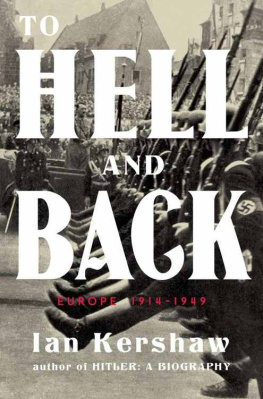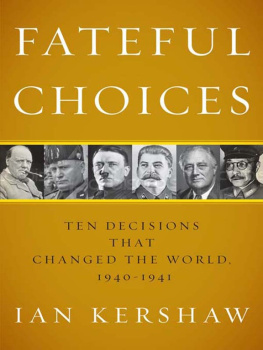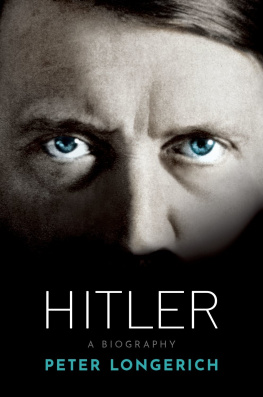PENGUIN BOOKS
HITLER
IAN KERSHAW is Professor of Modern History at the University of Sheffield. For services to history he was given the German award of the Federal Cross of Merit in 1994. He was knighted in 2002 and awarded the Norton Medlicott Medal by the Historical Association in 2004.
He was the historical adviser to three BBC series: The Nazis: A Warning from History, War of the Century and Auschwitz.
His most recent books are Hitler 18891936: Hubris and Hitler 19361945:Nemesis, which received the Wolfson Literary Award for History and the Bruno Kreisky Prize in Austria for the Political Book of the Year, and was joint winner of the inaugrual British Academy Book Prize; Making Friends with Hitler: Lord Londonderry and Britains Road to War, which won the Elizabeth Longford Prize for Historical Biography in 2005; and Fateful Choices: Ten Decisions that Changed the World, 194041.
IAN KERSHAW
Hitler

PENGUIN BOOKS
PENGUIN BOOKS
Published by the Penguin Group
Penguin Books Ltd, 80 Strand, London WC2R 0RL , England
Penguin Group (USA) Inc., 375 Hudson Street, New York, New York 10014, USA
Penguin Group (Canada), 90 Eglinton Avenue East, Suite 700, Toronto, Ontario, Canada M4P 2Y3 (a division of Pearson Penguin Canada Inc.)
Penguin Ireland, 25 St Stephens Green, Dublin 2, Ireland (a division of Penguin Books Ltd)
Penguin Group (Australia), 250 Camberwell Road, Camberwell, Victoria 3124, Australia (a division of Pearson Australia Group Pty Ltd)
Penguin Books India Pvt Ltd, 11 Community Centre, Panchsheel Park, New Delhi 110 017, India
Penguin Group (NZ), 67 Apollo Drive, Rosedale, North Shore 0632, New Zealand (a division of Pearson New Zealand Ltd)
Penguin Books (South Africa) (Pty) Ltd, 24 Sturdee Avenue, Rosebank, Johannesburg 2196, South Africa
Penguin Books Ltd, Registered Offices: 80 Strand, London, WC2R 0RL , England
www.penguin.com
Hitler, 18891936: Hubris first published 1998
Hitler, 19361945: Nemesis first published 2000
This one-volume abridgement with a new Preface first published by Allen Lane 2008
Published in Penguin Books 2009
Copyright Ian Kershaw, 1998, 2000, 2008
All rights reserved
The moral right of the author has been asserted
Except in the United States of America, this book is sold subject to the condition that it shall not, by way of trade or otherwise, be lent, re-sold, hired out, or otherwise circulated without the publishers prior consent in any form of binding or cover other than that in which it is published and without a similar condition including this condition being imposed on the subsequent purchaser
ISBN: 978-0-14-190959-2
Contents
List of Illustrations
Every effort has been made to contact all copyright holders. The publishers will be glad to make good in future editions any errors or omissions brought to their attention. (Photographic acknowledgements are given in brackets.)
Glossary of Abbreviations
BVP | Bayerische Volkspartei (Bavarian Peoples Party) |
DAP | Deutsche Arbeiterpartei (German Workers Party) |
DDP | Deutsche Demokratische Partei (German Democratic Party) |
DNVP | Deutschnationale Volkspartei (German National Peoples Party) |
DSP | Deutschsozialistische Partei (German-Socialist Party) |
DSVB | Deutschvlkische Freiheitsbewegung (German Folkish Freedom Movement) |
DVFP | Deutschvlkische Freiheitspartei (German Folkish Freedom Party) |
DVP | Deutsche Volkspartei (German Peoples Party) |
FHQ | Fhrer Hauptquartier (Fhrer Headquarters) |
KPD | Kommunistische Partei Deutschlands (Communist Party of Germany) |
NSDAP | Nationalsozialistische Deutsche Arbeiterpartei (Nazi Party) |
NSFB | Nationalsozialistische Freiheitsbewegung (National Socialist Freedom Movement) |
NSFP | Nationalsozialistische Freiheitspartei (National Socialist Freedom Party) |
NS-Hago | Nationalsozialistische Handwerks-, Handels- und Gewerbe-organisation (Nazi Craft, Commerce, and Trade Organization) |
OKH | Oberkommando des Heeres (High Command of the Army) |
OKW | Oberkommando der Wehrmacht (armed services) |
OT | Organisation Todt |
RSHA | Reichssicherheitshauptamt (Reich Security Head Office) |
SA | Sturmabteilung (Storm Troop) |
SD | Sicherheitsdienst (Security Service) |
SPD | Sozialdemokratische Partei Deutschlands (Social Democratic Party of Germany) |
SS | Schutzstaffel (lit. Protection Squad) |
Maps
1. The legacy of the First World War
2. Poland under Nazi occupation
3. The Western offensive: the Sichelschnitt attack
4. The German Reich of 1942: the Nazi Party Gaue
5. Nazi occupied Europe
6. Limits of the German occupation of the USSR
7. The Western and Eastern fronts, 19445
8. The Soviet drive to Berlin
Preface to the New Edition
It has been a source of immense satisfaction to me that the original two-volume biography, Hitler, 18891936: Hubris, and Hitler, 1936-1945: Nemesis, published in 1998 and 2000 respectively, was so well received, as also in the numerous countries where foreign-language editions were published. The warm reception in Germany was particularly gratifying.
My biography was above all intended to be a study of Hitlers power. I set out to answer two questions. The first was how Hitler had been possible. How could such a bizarre misfit ever have been in a position to take power in Germany, a modern, complex, economically developed, culturally advanced country? The second was how, then, Hitler could exercise power. He had great demagogic skills, certainly, and combined this with a sure eye for exploiting ruthlessly the weakness of his opponents. But he was an unsophisticated autodidact lacking all experience of government. From 1933 he had to deal not just with Nazi roughnecks but with a government machine and circles used to ruling. How could he then so swiftly dominate the established political lites, go on to draw Germany into a catastrophic high-risk gamble for European domination with a terrible, unprecedented genocidal programme at its heart, block all possibilities of a negotiated end to the conflict, and finally kill himself only when the arch-enemy was at his very door and his country physically and morally in total ruins?
I found the answer to these questions only partially in the personality of the strange individual who presided over Germanys fate during those twelve long years. Of course, personality counts in historical explanation. It would be foolish to suggest otherwise. And Hitler, as those who admired him or reviled him agreed, was an extraordinary personality (though, however varied and numerous the attempts at explanation are, only speculation is possible on the formative causes of his peculiar psychology). Hitler was not interchangeable. The type of individual that Hitler was unquestionably influenced crucial developments in decisive fashion. A Reich Chancellor Gring, for instance, would not have acted in the same way at numerous key junctures. It can be said with certainty: without Hitler, history would have been different.


















